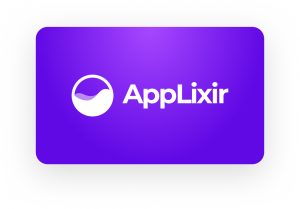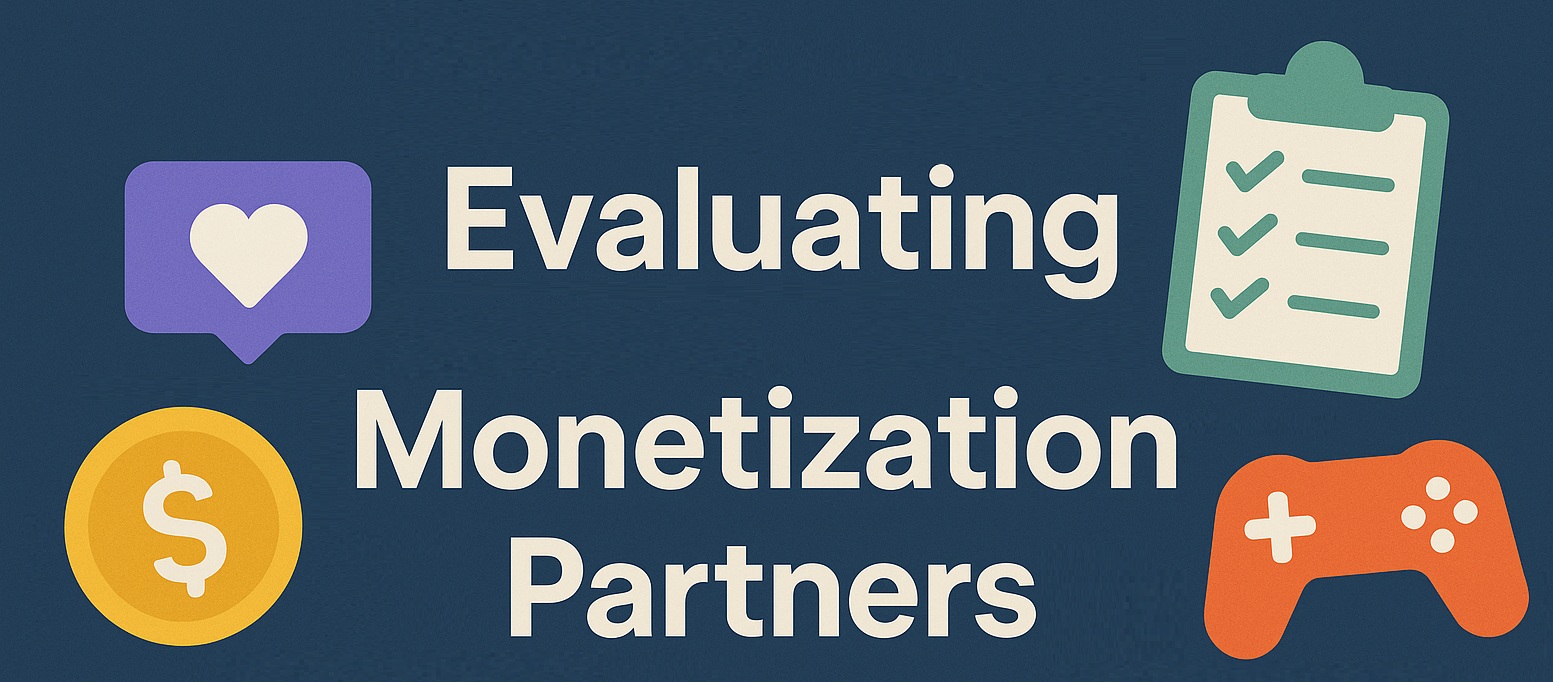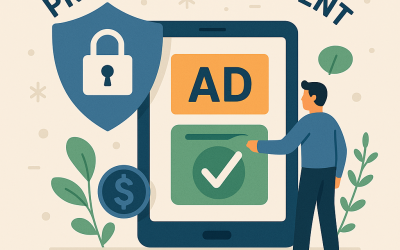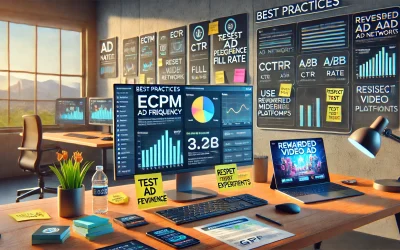The Complete Guide to Evaluating Game Monetization Partners
In today’s competitive gaming landscape, choosing the right monetization partner can make the difference between a marginally profitable game and a highly lucrative one. With the global gaming market projected to exceed $300 billion by 2027, developers need to maximize their revenue potential through strategic partnerships that align with their unique vision and goals.
The decision isn’t just about who offers the highest immediate revenue share—it’s about finding a long-term ally that understands the delicate balance between monetization and player experience. A misstep here can not only impact your bottom line but potentially damage player satisfaction and retention rates.
This comprehensive guide will walk you through the essential criteria for evaluating game monetization companies, providing you with the knowledge and tools to make an informed decision that serves your game’s specific needs and growth trajectory.
Contents
- 1 Core Evaluation Criteria
- 2 Creating Your Evaluation Framework
- 3 AppLixir Monetization Platform
Core Evaluation Criteria
1. Cross-Platform Capabilities
Modern games rarely exist on just one platform. Your monetization partner should offer seamless integration across all the environments where your players enjoy your game.
Platform-Specific Optimization
Different platforms present unique technical constraints and user behavior patterns. Mobile users might tolerate certain ad formats that desktop players find intrusive. Browser-based games have different loading considerations than downloadable applications. Your monetization partner should demonstrate expertise in optimizing for each platform’s specific characteristics.
For example, rewarded video ads might perform excellently on mobile but require different implementation strategies on desktop to maintain similar engagement rates. A high-quality monetization partner will have data-backed recommendations for each platform rather than a generic approach.
Platform Expansion Support
As your game grows, you may want to expand to additional platforms. Your monetization partner should have the capability to support this expansion, providing guidance on platform-specific monetization strategies and technical implementation. The transition should be smooth, allowing you to maintain consistent revenue while adapting to new environments.
Technical Integration Flexibility
Look for partners offering multiple integration options—SDKs, JavaScript tags, server-to-server solutions—that can adapt to your technical architecture and development workflow. This flexibility becomes particularly important when working with custom game engines or when platform requirements change.
2. Quality and Breadth of Demand
The value of each ad impression in your game directly correlates with the quality and competition among advertisers bidding for that space. A robust monetization partner connects you to a wide array of high-quality demand sources.
Demand Source Diversity
Elite monetization partners maintain relationships with multiple SSPs (Supply-Side Platforms), DSPs (Demand-Side Platforms), ad exchanges, and direct advertisers. This diversity creates a competitive auction environment where multiple buyers bid for your inventory, driving up prices.
Questions to ask potential partners:
- How many demand sources do they work with?
- What percentage of their demand comes from direct deals versus programmatic sources?
- Do they support header bidding or another advanced auction methodology that maximizes competition?
Brand Safety Controls
Premium brands are willing to pay higher rates but require assurances about where their ads appear. Your monetization partner should offer robust content categorization and brand safety controls that make your inventory attractive to these higher-paying advertisers.
Look for partners who comply with industry standards like IAB’s Content Taxonomy and offer transparency reports detailing who’s advertising in your game.
Geo-Specific Demand Strength
If your game has a global audience, your monetization partner should demonstrate strong demand relationships in all your key markets—not just the United States or Western Europe. Ask for region-specific benchmarks and how they optimize for different geographical audiences.
Some partners excel in specific regions due to local relationships or specialized knowledge. If 40% of your players come from Latin America, for instance, a partner with strong LATAM demand connections might outperform a US-focused company despite the latter having bigger overall demand partners.
3. Ease of Use and Integration
Your core business is game development, not ad operations. Your monetization solution should simplify rather than complicate your workflow.
Implementation Timeline
Request specific timelines for integration. High-quality partners typically provide detailed implementation guides, sample code, and dedicated technical support during onboarding. The integration process shouldn’t require more than a few days of developer time for standard implementations.
Dashboard Functionality
The management interface should provide comprehensive analytics while remaining intuitive. Look for dashboards that offer:
- Real-time revenue monitoring
- Granular performance breakdowns (by ad format, geo, time of day)
- A/B testing capabilities
- Easy configuration of floor prices and format settings
Automation Capabilities
Modern monetization platforms should employ machine learning to continuously optimize your setup, including:
- Dynamic floor price adjustment
- Optimal ad frequency calculation
- Format selection based on user behavior
- Predictive analytics for revenue forecasting
4. Commitment to Innovation
The digital advertising ecosystem evolves rapidly. Your monetization partner should not only keep pace with these changes but proactively develop new solutions that give you a competitive edge.
Format Innovation
Beyond standard display and video formats, leading partners develop creative new ad experiences that enhance rather than interrupt gameplay. These might include:
- Native in-game billboards or product placements
- Branded power-ups or character customizations
- AR/VR-specific ad formats
- Interactive playable ads that mirror your game’s mechanics
Privacy-Forward Solutions
With increasing privacy regulations worldwide, forward-thinking monetization partners are developing solutions that deliver strong performance without relying on personal data. This includes contextual targeting approaches, machine learning models that don’t require individual identifiers, and innovative consent management systems.
Investment in R&D
Ask potential partners about their research and development investments. What percentage of their resources goes toward innovation rather than maintaining existing systems? How frequently do they release new features? The answers will reveal whether they’re likely to keep you at the cutting edge or leave you with outdated technology as the industry advances.
5. Deep Demand Partner Relationships
The strength and longevity of a monetization company’s relationships with demand partners directly impact the quality of campaigns available to your game.
Preferred Partnership Status
Elite monetization companies often hold preferred or exclusive partnership status with major demand sources, giving them priority access to premium campaigns before they reach the open market. These relationships typically develop over years of reliable performance and can’t be easily replicated by newer market entrants.
Direct Advertiser Relationships
Partners with direct connections to major brand advertisers can create bespoke campaigns specifically tailored to gaming environments, often at higher rates than standard programmatic campaigns. These relationships become particularly valuable during high-demand seasons when advertising budgets increase.
Strategic Demand Partnerships
Some monetization companies form strategic partnerships with complementary demand companies, creating unique value propositions for advertisers. These might include special data partnerships, cross-platform tracking capabilities, or exclusive ad formats that command premium rates.
6. Transparency and Reporting
In an industry sometimes criticized for opacity, transparency should be non-negotiable. Your monetization partner should provide clear visibility into all aspects of your revenue generation.
Revenue Transparency
You deserve to know exactly how your revenue is calculated. This includes clear disclosure of:
- All fees and revenue shares
- Bid landscapes showing auction dynamics
- Discrepancies between served impressions and billable impressions
- Any volume discounts or bonuses applied
Performance Reporting
Comprehensive reporting should include:
- Real-time revenue dashboards with minimal lag
- Historical performance comparisons
- Custom reporting capabilities
- Exportable data for your own analysis
- API access for automated reporting
Supply Chain Transparency
The digital advertising supply chain often involves multiple intermediaries. Ask potential partners to disclose their complete supply path, including any sister companies or affiliated entities that may take a cut of your revenue before it reaches you.
While not the only consideration, financial terms remain a critical evaluation factor.
Competitive Revenue Sharing
Industry-standard revenue shares typically range from 70/30 to 85/15 in the publisher’s favor, depending on volume and exclusivity arrangements. However, the headline revenue share isn’t the complete picture—ask about:
- Any additional fees for premium features
- Volume-based incentive structures
- Performance bonuses for high engagement rates
- Long-term partnership incentives
Payment Reliability and Terms
Late or unreliable payments can severely impact your cash flow. Verify:
- Standard payment terms (Net-30 is ideal, Net-60 acceptable)
- Minimum payout thresholds
- Payment methods and currencies supported
- Track record of on-time payments
- Financial stability of the company
Publisher Financing Options
Some advanced monetization partners offer additional financial services such as:
- Revenue advances based on projected earnings
- Upfront bonuses for exclusivity commitments
- Investment options for high-potential games
- User acquisition financing tied to monetization performance
8. Customer Support and Account Management
The level of support you receive can significantly impact your monetization success, particularly during critical launch periods or seasonal promotions.
Support Infrastructure
Evaluate potential partners on:
- Support hours and coverage for your time zone
- Average response times for different issue severities
- Escalation procedures for critical problems
- Documentation quality and self-service resources
Dedicated Account Management
High-value partnerships should include dedicated account management with:
- Regular performance review meetings
- Proactive optimization recommendations
- Competitive intelligence and benchmark data
- Strategic planning for major game updates or events
Developer Community
Some monetization companies foster developer communities where you can share experiences and best practices with peers. These communities can provide valuable insights beyond what the company itself offers.
Creating Your Evaluation Framework
Weighted Scoring System
Not all factors should carry equal weight in your decision. Create a scoring system that reflects your specific priorities:
- Assign importance weights to each evaluation criterion (e.g., platform support might be weighted 20%, while payment terms might be 10%)
- Score each potential partner on each criterion (typically on a 1-5 scale)
- Calculate weighted scores and compare results
Phased Implementation Approach
Consider a phased approach to mitigate risk:
- Begin with a limited integration in a specific game section or user segment
- Measure both revenue impact and user experience metrics
- Expand implementation based on performance data
Ongoing Evaluation Process
Your relationship with your monetization partner shouldn’t be static:
- Establish clear KPIs for regular review
- Conduct quarterly performance evaluations
- Test competing solutions periodically to ensure continued competitiveness
- Maintain relationships with alternative providers
AppLixir Monetization Platform
Selecting the right game monetization partner is a strategic decision that impacts not just your immediate revenue but your long-term relationship with players and your competitive position in the market. The ideal partner combines technical excellence with business acumen and a genuine understanding of the gaming ecosystem.
Rather than focusing solely on who offers the highest revenue share today, evaluate potential partners on the full spectrum of criteria outlined in this guide. Consider how they’ll help you navigate industry changes, optimize your specific game mechanics for monetization, and scale alongside your growth.
Remember that the best partnerships are collaborative. The right monetization company should function as an extension of your team—deeply invested in your success and continuously working to maximize your game’s financial potential while preserving the player experience that makes it special.
By applying this comprehensive evaluation framework, you’ll be well-positioned to select a monetization partner that helps transform your creative vision into sustainable business success.
AppLixir is a cutting-edge game monetization platform that combines AI-driven optimization with premium brand partnerships to maximize developer revenue without compromising player experience. Unlike traditional monetization solutions, AppLixir specializes in non-intrusive ad formats that seamlessly integrate into gameplay, resulting in higher engagement rates and superior eCPMs across mobile, desktop, and web-based games. With an intuitive SDK that requires minimal implementation effort, real-time analytics providing actionable insights, and dedicated account management from industry veterans, AppLixir empowers developers to transform their games into sustainable revenue generators while maintaining the integrity of their creative vision. Whether you’re an indie developer or an established studio, AppLixir’s platform adapts to your unique needs, offering customized monetization strategies that grow alongside your success.



